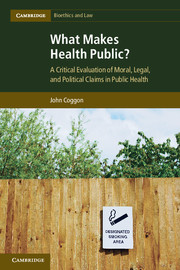 What Makes Health Public?
What Makes Health Public? Part I - Basic concepts in public health
Published online by Cambridge University Press: 05 June 2012
Summary
Introduction to Part I
The conceptual framing and critical analysis undertaken throughout this book are directed to investigating normative claims made in relation to public health. My central argument is that the meaningful studies that would apply practical philosophy to this are in politics. They should be informed by works from disciplines including moral philosophy, law, economics, and sociology, but the interesting and important health-related responsibilities – of States, private companies, and individuals – are political. Ideological differences, concerns for competing goods, and distinct forms of partiality at the base of disputes in political theory are therefore the relevant sources of contention. And it is in answers to these disputes that questions on public health are meaningfully answered. Some might suggest that this book should have explored the question “What makes health private?”; they might argue that I beg the question and presume a ‘liberal bias’. Others might contend that I beg the question by presuming that health could even be a public matter. In what follows I seek to vindicate my analysis against such accusations. In brief, I contend that it is wrong to take it that everything relating to health can just be either ‘private’ or ‘public’. I also argue that most theorists agree with this, and that all policy-makers do. However, our reasons for doing so differ. Thus my analysis lends itself to various important tasks. The first of these is to provide a conceptual and analytic ‘groundwork’ to understand the nature and scope of arguments in public health ethics and law. This is the purpose of Part I of the book.
- Type
- Chapter
- Information
- What Makes Health Public?A Critical Evaluation of Moral, Legal, and Political Claims in Public Health, pp. 9 - 10Publisher: Cambridge University PressPrint publication year: 2012
